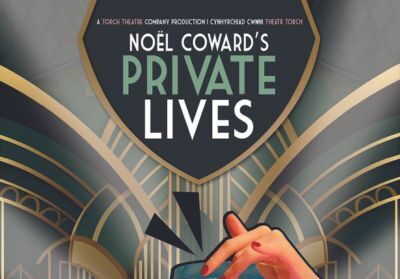Gary Raymond reviews Rhinoseros, Manon Steffan Ros’s adaptation of Eugene Ionesco’s 1959 absurdist masterpiece for Theatr Genedlaethol Cymru.
Last night I had a glimpse into what the future of theatre in Wales might look like for non-Welsh speakers, and it was not good. Theatr Genedleathol Cymru, operating with all the confidence that a new young artistic director often brings to such organisations, has mounted a powerful version of Ionesco’s absurdist 1959 masterpiece Rhinoceros, reimagined to a Welsh village by one of our country’s leading writers, Manon Steffan Ros. It is well-cast and effectively staged, directed by Steffan Donnelly with a clear vision; it is full of humour, grim satire, and tonally it is adroitly observed. Donnelly hits all the beats carefully laid out for him by Ros. But any non-Welsh speaker keen to see it would have been very poorly served by the company’s translation app, Sibrwd.
For those who know Ros’s work, and who know Ionesco’s play, the prospect of the two meeting on the modern stage is a mouth-watering prospect. Ionescu’s allegory is, to a large extent, about language and communication; Ros is a writer who is constantly unpicking the richness of Welsh and how is sits in the contemporary world (not just in Wales). Her novel Llyfr Glas Nebo/ The Blue Book of Nebo won every award going in its original Welsh, and then a Carnegie Medal in its English translation, and is a book about the role of language in cultural sustainability, in cultural strength, in cultural honesty. Rhinoseros, a play about a man, Berenger, who sees his townsfolk slowly turn into the titular pachyderms, is ready-made for an exploration of ideological divisions, of modern cults, internet contagions, and the all-pervasive influence of identity politics. I have sat through many Welsh language productions that have done great jobs at providing surtitles or simultaneous translations, some of which have been Theatre Genedlaethol productions. This was not one of them. And so the language was lost, the nuance was lost, the script was lost.
Sibrwd feels like something of a relic from the 2010s when everybody thought the answer to the world’s problems was “build an app”. (There was a lot of funding floating around for app building back then, I remember). But with Sibrwd what we have is not a translation of the text, such as what surtitles might give you, but a strange, detached voiceover delivered by an (albeit delightful) middle-class English voice reminiscent of the narrator from Peppa Pig. “Berenger says he doesn’t like alcohol, but it helps him with his social anxiety and so that’s why he drinks so much. Sian says it is the alcohol that causes his depression” is eerily reminiscent of “Daddy Pig eats too much cake. Mummy Pig says it’s his own fault he’s feeling sick.”
When the Arts Council of Wales announced a hundred percent cut to the funding of National Theatre Wales (Theatr Gen’s English language counterpart) before it has even decided what the proposed review of English language theatre even means, it consigned non-Welsh speaking theatre audiences in Wales to this sort of second-class citizenship in their own country.
This is, of course, not Theatre Genedlaethol’s fault. Their duty is to the Welsh language. But if any serious debate is going to be had about what the future holds for theatre in Wales, it will have to include a discussion around whether or not a new single bilingual national theatre is created. Then that company will have a duty to both languages, and Sibrwd will not be a solution. What we cannot have in Wales is a theatreland where Welsh language theatre is the place where real plays are put on, written by writers paid correctly, acted by big casts on big stages and directed by directors set free by real budgets. And across the street is yet another English language one man show about some recent RWCMD graduate’s love for aubergines.
As the Arts Council of Wales flails around trying to figure out exactly what it meant by a “review of English language theatre in Wales”, non-Welsh speakers have been denied the richness and complexity of a vital piece of contemporary theatre because the translation app is aimed at three-year-olds.
In the centre of Rhinoseros stands Berenger, hapless at first, but gradually, as the realisation that he is being isolated, losing his loved ones to the cult of horns, he grows to be strong as the stampedes grow fiercer, and the allegorical horror of the characters’ transformations become more intense. I had gone to the theatre expecting to see an allegory of politics and place and division and identity. I had not expected to feel like Berenger myself. And I had not expected the Rhinos to look like the Arts Council.
For details of Rhinoseros on tour click here.



 Enjoyed this article? Support our writers directly by buying them a coffee and clicking this link.
Enjoyed this article? Support our writers directly by buying them a coffee and clicking this link.








